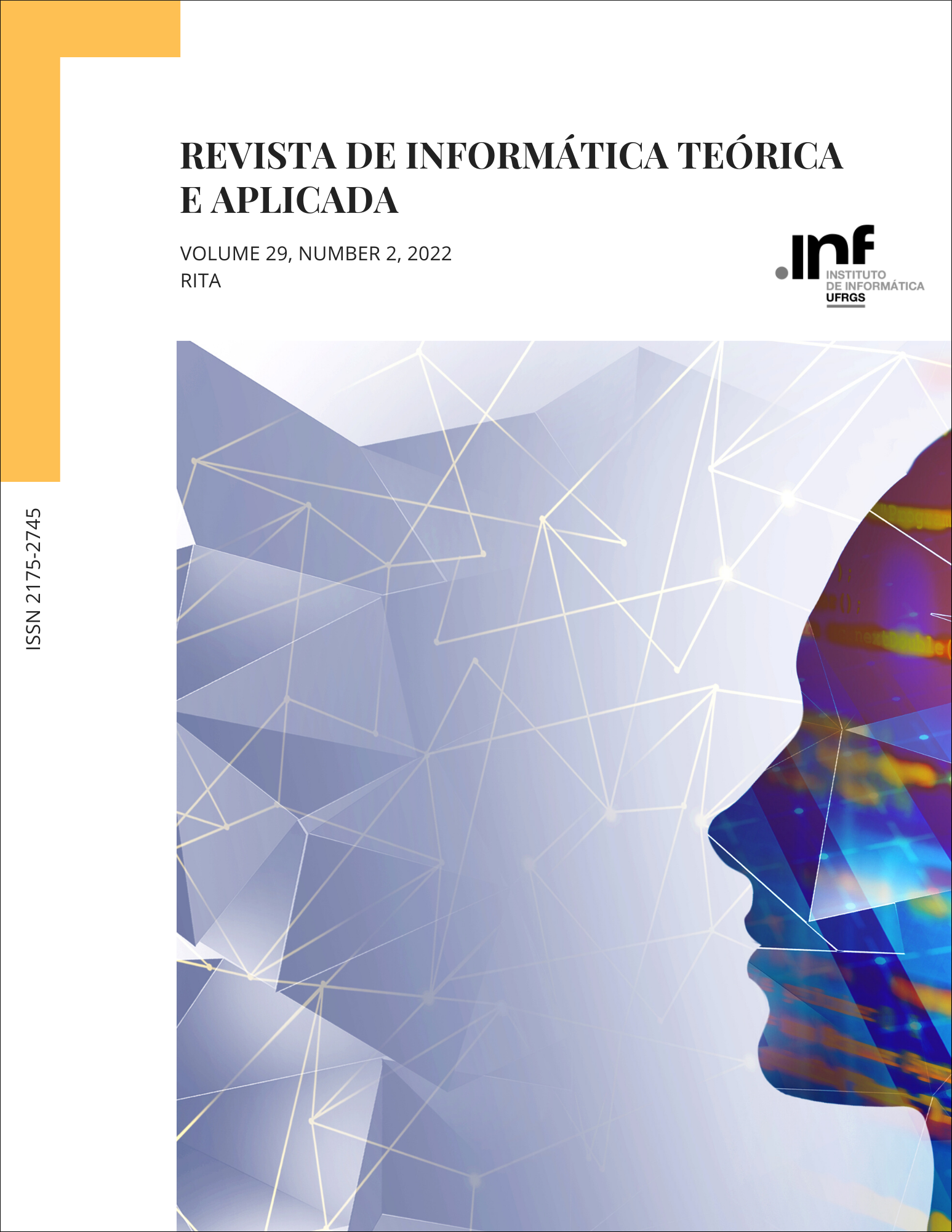Building Contrastive Summaries of Subjective Text Via Opinion Ranking
DOI:
https://doi.org/10.22456/2175-2745.118372Keywords:
opinion mining, evaluation, summarizationAbstract
This article investigates methods to automatically compare entities from opinionated text to help users to obtain important information from a large amount of data, a task known as “contrastive opinion summarization”. The task aims at generating contrastive summaries that highlight differences between entities given opinionated text (written about each entity individually) where opinions have been previously identified. These summaries are made by selecting sentences from the input data. The core of the problem is to find out how to choose these more relevant sentences in an appropriate manner. The proposed method uses a heuristic that makesdecisions according to the opinions found in the input text and to traits that a summary is expected to present. The evaluation is made by measuring three characteristics that contrastive summaries are expected to have: representativity (presence of opinions that are frequent in the input), contrastivity (presence of opinions that highlight differences between entities) and diversity (presence of different opinions to avoid redundancy). The novel method is compared to methods previously published and performs significantly better than them according to the measures used. The main contributions of this work are: a comparative analysis of methods of contrastive opinion summarization, the proposal of a systematic way to evaluate summaries, the development of a new method that performs better than others previously known and the creation of a dataset for the task.
Downloads
References
MANI, I.Automatic Summarization. [S.l.]: John Benjamins Publishing, 2001.
NAZARI, N.; MAHDAVI, M. A. A survey on automatic text summarization.Journal of AI and Data Mining, v. 7, n. 1, p.121 – 135, 2019.
NENKOVA, A.; MASKEY, S.; LIU, Y. Automatic summarization. In:Proceedings of the 49th Annual Meeting ofthe Association for Computational Linguistics: Tutorial Abstracts of ACL 2011. Stroudsburg, PA, USA: Association forComputational Linguistics, 2011. (HLT ’11), p. 3:1–3:86.
LIU, B.Sentiment Analysis and Opinion Mining. [S.l.]: Morgan and Claypool Publishers, 2012.
HOQUE, E.; CARENINI, G. Multiconvis: A visual text analytics system for exploring a collection of online conversations.In:Proceedings of the 21st International Conference on Intelligent User Interfaces. New York, NY, USA: ACM, 2016. (IUI’16), p. 96–107.
ZHANG, C. et al. Big data versus the crowd: Looking for relationships in all the right places. In:Proceedings of the 50thAnnual Meeting of the Association for Computational Linguistics: Long Papers - Volume 1. Stroudsburg, PA, USA: Associationfor Computational Linguistics, 2012. (ACL ’12), p. 825–834.
LERMAN, K.; BLAIR-GOLDENSOHN, S.; MCDONALD, R. Sentiment summarization: Evaluating and learning userpreferences. In:Proceedings of the 12th Conference of the European Chapter of the Association for Computational Linguistics.Stroudsburg, PA, USA: Association for Computational Linguistics, 2009. (EACL ’09), p. 514–522.
LIU, B.; HU, M.; CHENG, J. Opinion observer: Analyzing and comparing opinions on the web. In:Proceedings of the14th International Conference on World Wide Web. New York, NY, USA: ACM, 2005. (WWW ’05), p. 342–351.
JIN, J.; JI, P.; GU, R. Identifying comparative customer requirements from product online reviews for competitor analysis.Eng. Appl. Artif. Intell., Pergamon Press, Inc., Tarrytown, NY, USA, v. 49, n. C, p. 61–73, mar. 2016.
KIM, H. D.; ZHAI, C. Generating comparative summaries of contradictory opinions in text. In:Proceedings of the 18thACM Conference on Information and Knowledge Management. New York, NY, USA: ACM, 2009. (CIKM ’09), p. 385–394.
XU, X.; MENG, T.; CHENG, X. Aspect-based extractive summarization of online reviews. In:Proceedings of the 2011ACM Symposium on Applied Computing. New York, NY, USA: ACM, 2011. (SAC ’11), p. 968–975.
WANG, D.; ZHU, S.; LI, T. Sumview: A web-based engine for summarizing product reviews and customer opinions.Expert Syst. Appl., Pergamon Press, Inc., Tarrytown, NY, USA, v. 40, n. 1, p. 27–33, jan. 2013.
LERMAN, K.; MCDONALD, R. Contrastive summarization: An experiment with consumer reviews. In:Proceedingsof Human Language Technologies: The 2009 Annual Conference of the North American Chapter of the Association forComputational Linguistics, Companion Volume: Short Papers. Stroudsburg, PA, USA: Association for ComputationalLinguistics, 2009. (NAACL-Short ’09), p. 113–116.
WANG, D. et al. Comparative document summarization via discriminative sentence selection.ACM Trans. Knowl. Discov.Data, ACM, New York, NY, USA, v. 6, n. 3, p. 12:1–12:18, out. 2012.
SANCHAN, N.; BONTCHEVA, K.; AKER, A. Understanding man Preferences for Summary Designs in Online DebatesDomain.Polibits, scielomx, p. 79 – 85, 12 2016.
MACHADO, M. et al. Learning rules for automatic identification of implicit aspects in portuguese. In:Anais do XIIISimp ́osio Brasileiro de Tecnologia da Informac ̧ ̃ao e da Linguagem Humana. [S.l.: s.n.], 2021. p. 82–91.
MOZETIC, I.; GRCAR, M.; SMAILOVIC, J. Multilingual twitter sentiment classification: The role of human annotators.PLOS ONE, v. 11, 02 2016.
LITMAN, D.; FORBES, K.; SILLIMAN, S. Towards emotion prediction in spoken tutoring dialogues. In:CompanionVolume of the Proceedings of HLT-NAACL 2003 - Short Papers. [S.l.: s.n.], 2003. p. 52–54.
CORTIZ, D. et al. A weakly supervised dataset of fine-grained emotions in portuguese. In:Anais do XIII SimposioBrasileiro de Tecnologia da Informac ̧ ̃ao e da Linguagem Humana. Porto Alegre, RS, Brasil: SBC, 2021. p. 73–81.
VARGAS, F. A.; PARDO, T. A. S. Aspect clustering methods for sentiment analysis. In:Proceedings of the InternationalConference on Computational Processing of the Portuguese Language. [S.l.: s.n.], 2018. p. 365–374.
PIASECZNY, W.Adaptive document discovery for vertical search engines. Dissertac ̧ ̃ao (Mestrado) — Simon FraserUniversity, 2020.
SARPE, I.; VANDIN, F. Presto: Simple and scalable sampling techniques for the rigorous approximation of temporalmotif counts. In:Proceedings of the 2021 SIAM International Conference on Data Mining (SDM). [S.l.: s.n.], 2021. p.145–153.
CONDORI, R. E. L.; PARDO, T. A. S. Opinion summarization methods: Comparing and extending extractive andabstractive approaches.Expert Systems with Applications, v. 78, p. 124–134, 2017.
Downloads
Published
How to Cite
Issue
Section
License
Copyright (c) 2022 Raphael R. Silva, Thiago A. S. Pardo

This work is licensed under a Creative Commons Attribution-NonCommercial 4.0 International License.
Autorizo aos editores a publicação de meu artigo, caso seja aceito, em meio eletrônico de acordo com as regras do Public Knowledge Project.














